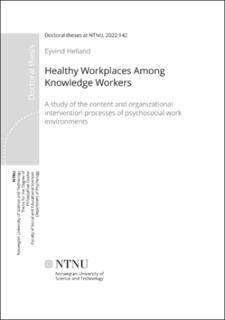| dc.contributor.advisor | Christensen, Marit | |
| dc.contributor.advisor | Innstrand, Siw Tone | |
| dc.contributor.advisor | Mehmetoglu, Mehmet | |
| dc.contributor.author | Helland, Eyvind | |
| dc.date.accessioned | 2022-05-05T09:38:05Z | |
| dc.date.available | 2022-05-05T09:38:05Z | |
| dc.date.issued | 2022 | |
| dc.identifier.isbn | 978-82-326-5944-9 | |
| dc.identifier.issn | 2703-8084 | |
| dc.identifier.uri | https://hdl.handle.net/11250/2994328 | |
| dc.description.abstract | For employees, the psychosocial work environment brings health risks and opportunities for health promotion and well-being. In general, there is a movement towards more demands and fewer resources, such as job autonomy, among knowledge workers, with consequences for employees' health, well-being, and the quality of knowledge-generation and application. Understanding how to counteract this while simultaneously developing healthy workplaces has significant implications for knowledge workers, organizations, and the public.
Using the World Health Organization's Healthy Workplace model (Burton, 2010) as an overarching framework, this thesis applies a multi-method approach to study the development of healthy workplaces among knowledge workers by investigating the content and processes of psychosocial work environments. First, it uses structural equation modeling (SEM) to examine knowledge workers' relationship between empowering leadership, pertinent work characteristics, and work engagement (content, paper I). Then, using thematic analysis, it studies the roles of line managers and safety representatives in an organizational intervention adopted to knowledge-intensive organizations (process, papers II and III).
Based on the findings of papers I-III, this thesis proposes three critical factors for creating healthy workplaces among knowledge workers through the psychosocial work environment:
1) The role of the line manager is crucial in terms of empowering leadership and their proactive work behaviors in organizational interventions; 2) all levels of an organization need to contribute in daily work and organizational interventions; and 3) employee involvement (i.e., the Nordic model for working life and safety representatives' job crafting) is decisive for intervention implementation. The thesis also discusses theoretical and practical implications as well as limitations and future research. | en_US |
| dc.language.iso | eng | en_US |
| dc.publisher | NTNU | en_US |
| dc.relation.ispartofseries | Doctoral theses at NTNU;2022:142 | |
| dc.relation.haspart | Paper 1: Helland, Eyvind; Christensen, Marit; Innstrand, Siw Tone. The Relationship between Empowering Leadership, Work Characteristics, and Work Engagement among Academics: A Sem Mediation Analysis. Scandinavian Journal of Work and Organizational Psychology 2020 ;Volum 5.(1) s. 1-13 http://doi.org/10.16993/sjwop.84 This is an open-access article distributed under the terms of the Creative Commons Attribution 4.0 International License (CC-BY 4.0) | en_US |
| dc.relation.haspart | Paper 2: Helland, Eyvind; Christensen, Marit; Innstrand, Siw Tone; Nielsen, Karina Marietta. Line managers' middle-levelness and driving proactive behaviors in organizational interventions. International Journal of Workplace Health Management 2021 ;Volum 14.(6) s. 577-592 https://doi.org/10.1108/IJWHM-08-2020-0136 | en_US |
| dc.relation.haspart | Paper 3: Helland, Eyvind; Christensen, Marit; Innstrand, Siw Tone; Iversen, Anne; Nielsen, Karina. Safety Representatives’ Job Crafting in Organizational Interventions: Driver, Counselor, Watchdog, or Abstainer. Scandinavian Journal of Work and Organizational Psychology 2021 ;Volum 6.(1) http://doi.org/10.16993/sjwop.137
This is an open-access article distributed under the terms of the Creative Commons Attribution 4.0 International License (CC-BY 4.0) | en_US |
| dc.title | Healthy Workplaces Among Knowledge Workers: A study of the content and organizational intervention processes of psychosocial work environments | en_US |
| dc.type | Doctoral thesis | en_US |
| dc.subject.nsi | VDP::Social science: 200::Psychology: 260 | en_US |

